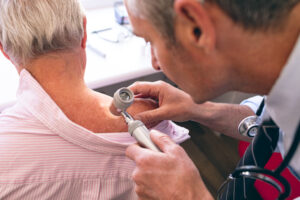Ménière’s Disease is a medical condition that affects the inner ear, leading to vertiginous episodes, dizziness, and a sense of disorientation. Many service members and veterans suffer from this disorder, which can have a significant impact on their daily lives. It is crucial to recognize the symptoms, understand the causes, and explore how Ménière’s Disease and veterans disability can be linked in some individuals.

Symptoms of Ménière’s Disease
Individuals experiencing Ménière’s Disease may experience various symptoms, including:
- Vertigo and Dizziness: Episodes of feeling off balance or dizzy.
- Hearing Loss: Some may experience hearing impairment.
- Sweating: Sweating episodes can be a symptom of Ménière’s Disease.
- Tinnitus: Ringing or buzzing in the ears.
- Nausea: The condition can lead to feelings of nausea.
It’s important to note that while Ménière’s is a common disorder, other conditions such as BPPV (benign paroxysmal positional vertigo) can cause similar symptoms. Therefore, individuals experiencing these symptoms should consult with healthcare providers, including but not limited to ENT doctors and audiologists, to accurately diagnose the underlying issue.
Service Connection for Ménière’s Disease
Primary Service Connection
Direct Service Connection
Veterans may be eligible for disability benefits if they can establish a direct service connection. If the symptoms of Ménière’s Disease began during active duty and the individual was diagnosed with the condition at that time, they could qualify for service connection. Even if veterans were not diagnosed until years later, they still may be eligible.
Acoustic Noise Exposure
One significant factor to consider is acoustic noise exposure during military service. Studies, such as one published in the Korean Journal of Audiology in 2014, suggest that post-traumatic Ménière’s Disease can develop after acoustic or physical trauma. This trauma can include blows to the head, temporal bone fractures, previous ear operations, and exposure to loud noises like gunshot blasts or IED blasts.
Secondary Service Connection
Ménière’s Disease can also be connected to service on a secondary basis. For instance, if an individual has a traumatic brain injury (TBI) during service and experiences vertiginous issues as a result, this can be considered a secondary service connection.
Conclusion
Ménière’s Disease can have a profound impact on the lives of veterans and service members. Recognizing the symptoms, understanding the potential service connections, and exploring the associated disability ratings are crucial steps for individuals seeking support and benefits. Veterans are encouraged to work with Veterans Service Organizations (VSOs), accredited claims agents, or attorneys to navigate the claims process effectively and secure the benefits they deserve for their service-related health conditions.
Also read: Femoroacetabular Impingement Syndrome and Veterans Disability
At Prestige Veteran Medical Consulting, a veteran-owned company, we specialize in Independent Medical Opinions (IMOs) known as Nexus letters.
Our purpose is to empower YOU, the veteran, to take charge of your medical evidence and provide you with valuable educational tools and research to guide you on your journey.
Understanding the unique challenges veterans face, our commitment lies in delivering exceptional service and support.
Leveraging an extensive network of licensed independent medical professionals, all well-versed in the medical professional aspects of the VA claims process, we review the necessary medical evidence to incorporate in our reports related to your VA Disability Claim.
Prestige Veteran Medical Consulting is not a law firm, accredited claims agent, or affiliated with the Veterans Administration or Veterans Services Organizations. However, we are happy to discuss your case with your accredited VA legal professional.













